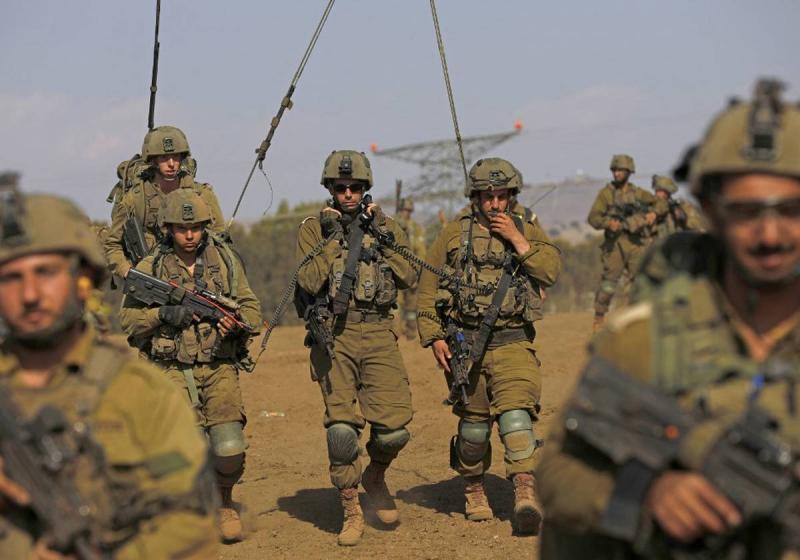Israeli forces launched ground operations against the Palestinian Islamic Resistance Movement (Hamas) in Gaza on Sunday, which Israeli Prime Minister Benjamin Netanyahu described as the second phase of the ongoing war that aims to crush the armed group. Residents of the besieged Gaza faced a near-total cut in communications and the internet as Israeli warplanes dropped bombs and its troops and armored vehicles entered the Hamas-controlled territory, with Israeli military leaders indicating they are preparing for an expanded ground assault.
Speaking at a press conference in Tel Aviv on Saturday, Netanyahu warned Israelis to expect a "long and difficult campaign," but did not go so far as to describe the current incursions as an invasion. U.S. officials have mentioned that some advisors to President Joe Biden have advised their Israeli counterparts to delay an immediate comprehensive attack.
Although the initial ground operations appear limited at present, Netanyahu vowed not to spare any effort to free more than 200 hostages, including Americans and other foreigners, held by Hamas. He told reporters, "This is the second phase of the war with clear objectives: to destroy Hamas's governing and military capabilities and to return the hostages." He added, "We are just at the beginning. We will destroy the enemy above ground and below it."
Israel has intensified its blockade and bombarded Gaza for three weeks since the devastating attack launched by Hamas on October 7. Israeli authorities have stated that at least 1,400 Israelis have been killed in the deadliest day in the country's 75-year history. Generally, Western nations support what they claim to be Israel's right to defend itself. However, there is growing international anger over the number of casualties from the bombings, alongside increasing calls for a "humanitarian ceasefire" to allow aid to reach civilians in Gaza and alleviate the humanitarian crisis.
Medical authorities in the Gaza Strip, home to 2.3 million people, report that 7,650 Palestinians have been killed in Israeli airstrikes. Palestinian President Mahmoud Abbas stated, "Our people in the Gaza Strip are facing a war of genocide and massacres committed by the Israeli occupation forces in front of the whole world." With many buildings turned to rubble and finding shelter becoming increasingly difficult, the residents of Gaza face food, water, fuel, and medical shortages. Their plight worsened since Friday night when communication services were cut off, followed by intense bombardment throughout the night. The communication blackout continued through Sunday.
A journalist in Gaza, who spent a terrifying night on the stairs of a building while bombs were falling and Israeli forces appeared to exchange fire with Palestinian fighters, said, "God help anyone under the rubble." The chief military spokesperson of Israel declined to comment on whether Israel was behind the communication blackout in Gaza, but stated that it would do what is necessary to protect its forces.
*Targeting Hamas's Tunnel Maze*
The Israeli army stated that it deployed troops and tanks to Gaza on Friday evening, focusing on infrastructure, including the extensive tunnel network built by Hamas. It did not provide details on the scale of the deployment. Netanyahu reiterated on Saturday Israel's call for Palestinian civilians to evacuate northern Gaza, where Israel is concentrating its attack on Hamas hideouts and other facilities. However, Palestinians contend that there is no safe space, as the bombs have also destroyed homes in the densely populated southern sector.
UN Secretary-General Antonio Guterres remarked that "a humanitarian disaster is unfolding before our eyes." Diplomats mentioned that the UN Security Council plans to meet on Monday to discuss the crisis between Israel and Gaza. Billionaire Elon Musk offered the operation of his SpaceX Starlink satellite communications service in Gaza "for internationally recognized relief organizations." Israel responded that it would oppose this move, asserting that Hamas "would use it for terrorist activities." Netanyahu, who met with the families of the hostages on Saturday, said that communications to secure their release would continue even during the ground attack and that military pressure on Hamas might assist in their return, without giving further details.
An informed source stated that Qatari-mediated negotiations between Israel and Hamas have continued but at a much slower pace than before Friday's escalation in Gaza. Hamas's military wing, the Al-Qassam Brigades, reported that its fighters clashed with Israeli forces in northeastern and central Gaza. They added that "the Al-Qassam Brigades and all Palestinian resistance forces are fully prepared to resist the aggression and thwart the incursions."
The United States and other Western countries have urged Israel to refrain from launching a major ground offensive for fear of a high number of Palestinian casualties and the expansion of the conflict, as well as allowing more time for negotiations regarding the hostages. However, U.S. officials stated that it is up to Israel to make its own decisions. Amid fears that the war between Israel and Hamas could escalate into a regional conflict, Defense Minister Yoav Galant told reporters that Israel has no interest in extending the fighting beyond Gaza but is prepared on all fronts.
The crisis has prompted hundreds of thousands of pro-Palestinian demonstrators to take to the streets in cities across Europe, the Middle East, and Asia on Saturday.




